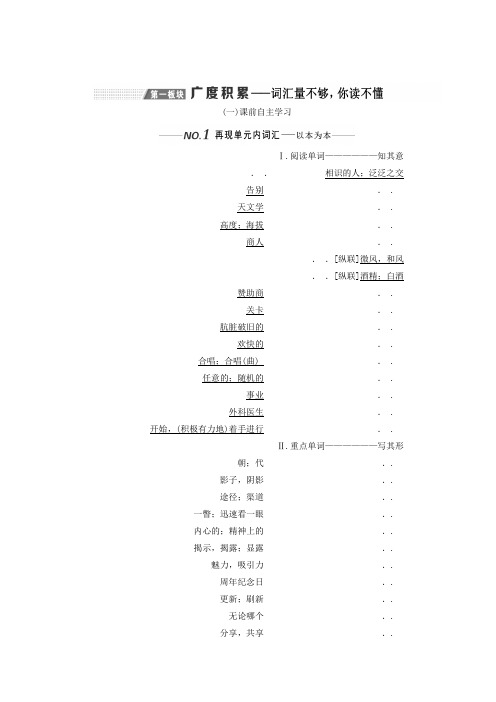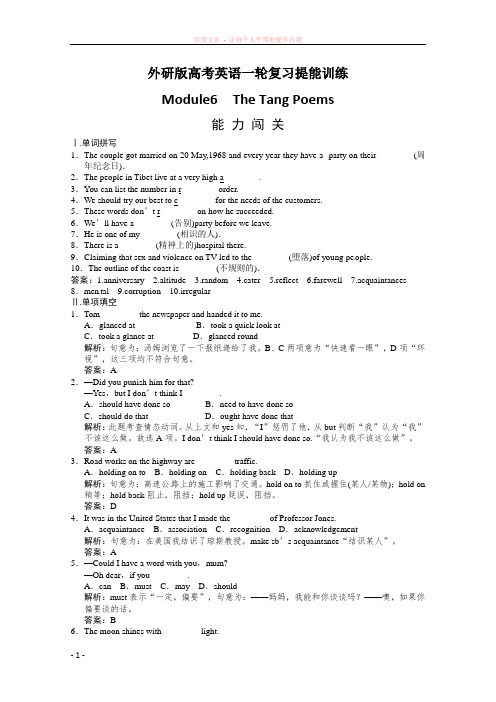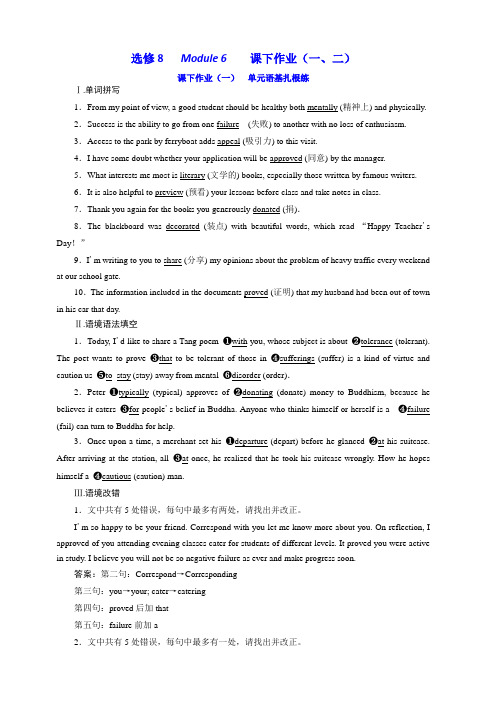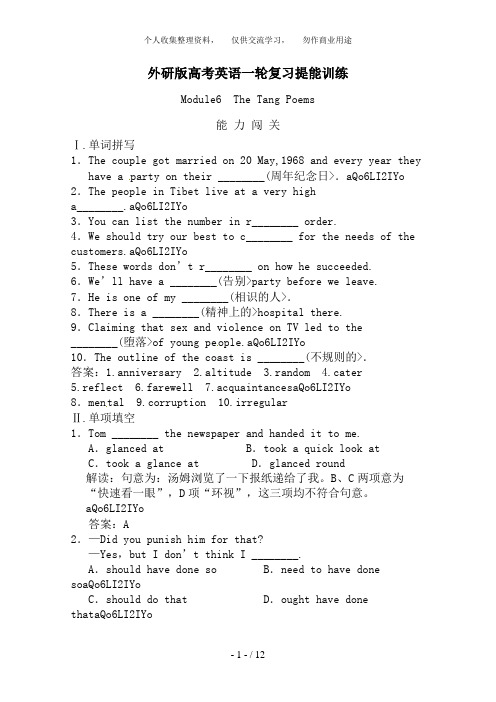2020届高考英语(外研版)一轮复习选修8练习 Module 6——主观题强化增分专练(练规范)
- 格式:doc
- 大小:31.50 KB
- 文档页数:3

Module 6 The Tang Poems一、背单词与词块(一)背阅读单词——会认就行(背诵时遮住右侧汉语,先自主翻译,后比对词义)1.acquaintance n.相识的人;泛泛之交2.farewell n.告另3.astronomy n.天文学4.shadow n.影子,阴影5.altitude n.高度;海拔6.merchant n.商人(二)背重点单词——写对才行1.seed".种子2.dynasty1 朝;代3.sharer.分享,共享4.mentaktZA 内心的;精神上的5.disorder//,混乱,失调;紊乱6.channels,途径;渠道7.glancer. 一瞥;迅速看一眼8.sponsors,赞助商9.expense//,费用unch。
.开始,(积极有力地)着手进行11.reveals,揭示,揭露;显露12.appeal% 魅力,吸引力13.merryaJA 欢快的14.anniversary^.周年纪念日15.updater,更新;刷新16.whichever”。
% 无论哪个17.preview% 预观;预看(三)背拓展单词——用准才行1.expand v.扩大:扩张:扩展f exnansion/z.扩张2.tolerate v.忍受f tolerantadj.宽容的:容忍的f tolerance”.容忍3.special a切•特别的;专门的fspeciallyado.特别地f specialist”,专家4.advance n.进步;进展f advanced。
力.先进的:高级的5.fail v.失败f failure".失败者;失败(2)think of... as ...=look on ... as ...=consider/see/view/regard …as …意思是”把看作……”。
(3)hand in hand意思是“手拉手”,类似的短语有:arm in arm臂挽着臂;shoulder to shoulder/side by side 肩并肩;face to face 面对面。

(一)课前自主学习Ⅰ.阅读单词——————知其意..相识的人;泛泛之交告别..天文学..高度;海拔..商人....[微风,和风]纵联..[]纵联酒精;白酒.赞助商.关卡...肮脏破旧的..欢快的.(合唱;合唱曲.)..任意的;随机的.事业..外科医生..积极有力地开始,()..着手进行Ⅱ.重点单词——————写其形朝;代..影子,阴影..途径;渠道..一瞥;迅速看一眼..内心的;精神上的..揭示,揭露;显露..魅力,吸引力..周年纪念日..更新;刷新....无论哪个分享,共享..Ⅲ.拓展单词——————通其变..扩张→.扩大;扩张;膨胀. .宽容的;容忍的→.容忍→.忍受;容忍[纵联]..专家→.特别的;专门的→.特别地..进步;进展→.高级的;先进的..失败者;失败→.失败..(肉体或精神上的)痛苦;苦难→.遭受(痛苦);患……. .不规则的;无规律的→.规则的;有规律的..倒影;映像;反映;反射;沉思→.反映;显示;表达..证明是;被发现是→.证据;证明..赞成;同意→.赞许;赞成..警告;劝……小心.谨慎;小心→.小心的;谨慎的→.小心地;谨慎地. .文学的→.文学..启程;上路→.出发;启程[纵联]..提供;捐→.奉献;捐献;捐赠..装点;美化→.装饰(品)→.装饰的..独立→.独立的→.依靠的;依赖的→.依靠;依赖..想象;空想→.想象→.富有想象力的. .典型地,有代表性地;向来,一向→.典型的纵联.“风”来“风”语①微风②风③阵风④大风⑤暴风⑥飓风⑦台风⑧龙卷风纵联.正宗的“酒”有哪些?①酒精;白酒②啤酒③白酒④酒;烈性酒⑤烈酒⑥香槟酒⑦鸡尾酒⑧威士忌纵联.形容词后缀想到的①宽容的;容忍的②抵抗的③令人愉快的④有意义的,重大的⑤重要的⑥无知的纵联.名词后缀①启程;上路②农业;农学③尺寸;大小④家具(总称)⑤混合物⑥图画;图片⑦温度⑧冒险;奇遇⑨结构⑩压力单元话题——唐诗子话题诗词歌赋②.歌谣①.诗(总称)③.歌词;抒情诗④.诗行⑤.诗节⑥.押韵⑦.散文⑧ .抒情的⑨.排比⑩.比喻⑪.夸张⑫.拟人子话题文学鉴赏① .杰出的②.名声,名誉③ .宝贵的④ .文学的⑤.鉴赏⑥.批判主义⑦.批评;批判⑧.版权;著作权⑨.卷⑩畅销书⑪ .现实的;逼真的⑫.情感;情绪·[学考对接]活学活用高考采撷(一) 阅读中的词汇应用.(·四川高考阅读) , ❶❷, .①写出在句中的含义:精神上的词意为:身体的;与其相对应的单(是介词②写出在本单元中的近义词:;常用搭配)把……奉献给;致力于……意为:(·.) ,江苏高考阅读() .❷() , , :❶①用的正确形式填空:;其同义词为:②用的正确形式填空:,在本句中意为:反映高考采撷(二) 写作中的词汇应用(根据汉语及提示词翻译句子).(·全国卷Ⅰ书面表达)我认为和你一起学习唐朝时期写的诗很有趣。

外研版高考英语一轮复习提能训练Module6The Tang Poems能力闯关Ⅰ.单词拼写1.The couple got married on 20 May,1968 and every year they have a party on their ________(周年纪念日).2.The people in Tibet live at a very high a________.3.You can list the number in r________ order.4.We should try our best to c________ for the needs of the customers.5.These words don’t r________ on how he succeeded.6.We’ll have a ________(告别)party before we leave.7.He is one of my ________(相识的人).8.There is a ________(精神上的)hospital there.9.Claiming that sex and violence on TV led to the ________(堕落)of young pe ople.10.The outline of the coast is ________(不规则的).答案:1.anniversary 2.altitude 3.random 4.cater 5.reflect 6.farewell7.acquaintances 8.men tal9.corruption10.irregularⅡ.单项填空1.Tom ________ the newspaper and handed it to me.A.glanced at B.took a quick look atC.took a glance at D.glanced round解析:句意为:汤姆浏览了一下报纸递给了我。

Ⅰ.完形填空(共20小题;每小题1.5分,满分30分)阅读下面短文,从短文后各题所给的A、B、C和D四个选项中,选出可以填入空白处的最佳选项。
My personality has always been designed for animals.I love everything about them.I feel like animals are to be admired and 1,never abused.Today,this 2 really showed!I went out for a simple walk to my library,when I 3 a dog!The dog looked like a German Shepard,and I,being an animal 4,approached it.I noticed it had a 5,but no leash.I tried asking multiple people around the dog if it 6 them,but everyone said no.I felt so bad,and didn’t know what to do.She was so friendly and sweet that I felt 7 about just leaving her there.Then,what do you know?She starts8 me!I couldn’t help but smile at that.I was the only one who showed any 9 in her,petting her,talking to her,walking with her.So,together,we walked towards the 10.I finally got a chance to 11 the number on her collar,but no one picked up!I was so 12 about this animal,and I was determined not to just leave it 13 around.I planned to head to a pet store.However,before I even got to a store,a car14 up in front of me with a father and two kids.15 that she was their dog,and had gotten 16 when the little boy opened their fence!They were so 17 to find her,and 18 me non-stop.I was relieved too!The dog 19 jumped into the car and I said goodbye to it.I felt such a 20 of accomplishment afterwards,knowing I had bonded with an animal in need,and helped make sure it got to its rightful owners.【语篇导读】本文是记叙文。

选修8 Module 6 课下作业(一、二)课下作业(一)单元语基扎根练Ⅰ.单词拼写1.From my point of view, a good student should be healthy both mentally (精神上) and physically.2.Success is the ability to go from one failure (失败) to another with no loss of enthusiasm.3.Access to the park by ferryboat adds appeal (吸引力) to this visit.4.I have some doubt whether your application will be approved (同意) by the manager.5.What interests me most is literary (文学的) books, especially those written by famous writers.6.It is also helpful to preview (预看) your lessons before class and take notes in class.7.Thank you again for the books you generously donated (捐).8.The blackboard was decorated (装点) with beautiful words, which read “Happy Teacher's Day!”9.I'm writing to you to share (分享) my opinions about the problem of heavy traffic every weekend at our school gate.10.The information included in the documents proved (证明) that my husband had been out of town in his car that day.Ⅱ.语境语法填空1.Today, I'd like to share a Tang poem ❶with you, whose subject is about ❷tolerance (tolerant). The poet wants to prove ❸that to be tolerant of those in ❹sufferings (suffer) is a kind of virtue and caution us ❺to_stay (stay) away from mental ❻disorder (order).2.Peter ❶typically (typical) approves of ❷donating (donate) money to Buddhism, because he believes it caters ❸for people's belief in Buddha. Anyone who thinks himself or herself is a ❹failure (fail) can turn to Buddha for help.3.Once upon a time, a merchant set his ❶departure (depart) before he glanced ❷at his suitcase. After arriving at the station, all ❸at once, he realized that he took his suitcase wrongly. How he hopes himself a ❹cautious (caution) man.Ⅲ.语境改错1.文中共有5处错误,每句中最多有两处,请找出并改正。

外研版高考英语一轮复习提能训练Module6 The Tang Poems能力闯关Ⅰ.单词拼写1.The couple got married on 20 May,1968 and every year they have a party on their ________(周年纪念日>.aQo6LI2IYo 2.The people in Tibet live at a very higha________.aQo6LI2IYo3.You can list the number in r________ order.4.We should try our best to c________ for the needs of the customers.aQo6LI2IYo5.These words don’t r________ on how he succeeded.6.We’ll have a ________(告别>party before we leave.7.He is one of my ________(相识的人>.8.There is a ________(精神上的>hospital there.9.Claiming that sex and violence on TV led to the________(堕落>of young people.aQo6LI2IYo10.The outline of the coast is ________(不规则的>.答案:1.anniversary 2.altitude 3.random 4.cater5.reflect6.farewell7.acquaintancesaQo6LI2IYo8.mental 9.corruption 10.irregularⅡ.单项填空1.Tom ________ the newspaper and handed it to me.A.glanced at B.took a quick look atC.took a glance at D.glanced round解读:句意为:汤姆浏览了一下报纸递给了我。
阶段仿真检测(八)必修四Modules 4~6【说明】本试卷分为第Ⅰ卷(选择题)和第Ⅱ卷(非选择题)两部分。
满分150分,考试时间120分钟。
第Ⅰ卷(选择题,共115分)第一部分:听力(共两节,满分30分)第一节(共5小题;每小题1.5分,满分7.5分)听下面5段对话。
每段对话后有一个小题,从题中所给的A、B、C三个选项中选出最佳选项,并标在试卷的相应位置。
听完每段对话后,你都有10秒钟的时间来回答有关小题和阅读下一小题。
每段对话仅读一遍。
(Text 1)W:Is it true you only spent $ 32 on two dinners?M:No,I only spent half of that.1.How much did each dinner cost?A.$16.B.$8.C.$32.答案:B(Text 2)M:Sally broke her arm last week.W:How did she do that? She'd always been careful.2.What does the woman want to know?A.Where Sally lost her money last week.B.What Sally had done to break her arm.C.How Sally was feeling.答案:B(Text 3)M:I was hoping that you'd wear your new dress.It's much prettier.W:But this one is more comfortable for hot weather.3.Which dress did the woman wear?A.The prettier one.B.The new one.C.The more comfortable one.答案:C(Text 4)M:Excuse me,are you Ann Robinson?W:No,I'm not.I'm her sister.4.Who is the woman?A.Ann Robinson's brother.B.Ann Robinson's sister.C.Ann Robinson's friend.答案:B(Text 5)M:Excuse me.How much is the T-shirt?W:It's 35 dollars.M:But it's too small for me.Do you have a bigger one?W:Yes,here you are.5.What is the relationship between the two speakers?A.Teacher and student.B.Parent and child.C.Shop assistant and customer.第二节(共15小题;每小题1.5分,满分22.5分)听下面5段对话或独白。
Module 6 The Tang Poems一、课前基础自查(一)分类记单词——省时高效16.independence n.独立→independent adj.(二)练中记短语——记牢用活(三)仿写明句式——以用为本into a river while trying to take hold of the while 时间状语从句二、课堂重点深化1.prove link-v .证明是;被发现是 v t .证明,证实 [自主体验] 单句语法填空①The boy tried to prove himself to_be (be) a good student and he really proved best. ②These results are further proofs (prove) of his outstanding ability. [系统归纳]易错处处防③It turned out that all his excuses were proved to be unreasonable.去掉were佳句时时写④已经证明经常锻炼对人们的健康有益。
It_has_been_proved_that_taking_exercise_regularly_does_good_to_one's_health.2.approve vi.赞成;同意v t.批准;通过[自主体验]单句语法填空①I approve of your trying (try) to make some money, but please don't neglect your studies.②Many youngsters now measure their status by how much public approval (approve) they get online.③Do you approve of the idea that success can be measured in terms of money alone?[系统归纳]易错对对碰(approve, approve of)④I'm afraid your parents won't approve_of your going there.⑤The National People's Congress approved the bill.佳句时时写⑥如果我的缺席得到批准,我将不胜感激。
2020届一轮复习外研版选修八Module6The Tang Poems 单元学案重点单词点拨【词条1】suffer【点拨】suffer用作及物动词或不及物动词均可,而且词义较多,具体用法如下:suffer vt.“遭受;忍受;经历”;suffer pain“受痛苦”;suffer hunger“挨饿”。
例如:I will not suffer such things.suffer vi.“受痛苦;受损害;受损失;患病”。
例如:Your studies will suffer if you play too much football.注意:suffering n. 指“身体或精神上的痛苦”,着重指“对痛苦的感觉和忍受”,一般用于人。
【拓展】suffer from与suffer for用法辨析:suffer from ... 表示“患……病、受……苦”;而suffer for ... 则表示“为……而受苦”。
【词条2】share【点拨】share既可以用作及物动词又可以用作不及物动词,还可以用作名词;既是学习的重点,又是高考的考点,其主要用法为:share vt. 表示“分享、分担、共有、共用”,后接名词。
常用的结构有:①share sth. ②share sth. with sb. ③share sth. between sb.等。
例如:They shared the cake between them.s hare vi. 表示“分享、分担”。
常用短语有:①share out ②share with ③share in等。
例如:We all shared in her happiness when she won the scholarship.share n. 表示“份儿、一份、股份”,是可数名词。
表示“负担量、份额”,是不可数名词。
例如:We gave each of the five children an equal sha re.【词条3】control【点拨】control 既可用作动词,也可用作名词,常意为“指挥、掌管、控制、支配、克制、管辖”。
选修八·Module 6 单元话题·语篇训练Ⅰ.语法填空
The history of Chinese poetry dates back almost 2,700 years __1__the Spring and Autumn period (770-476 BC). Records are rare before that time __2__ Qin Shi Huang destroyed all the books that could __3__ (locate). The styles, rules, and regulations for Chinese poetry gradually __4__ (change) over the centuries until the time of the Tang Dynasty (618-907 AD). This became the golden age for Chinese poetry. During that time a number of __5__ (product) poets turned out as many as 50,000 classical poems. All aspects of Chinese society __6__ (high) regarded these poets. Seven-character lines became very popular.
Poetry, paintings, and calligraphy(书法) are three of these art forms that go particularly well together. Many poets were also excellent __7__ (paint) and calligraphers. A poem would be written for __8__ purpose of matching a painting and then written into the forefront of the painting with traditional Chinese calligraphy. This gives the paintings deeper __9__(mean) and more elegance. It is common __10__ (find) this type of poetry, calligraphy art hanging in people's homes.
语篇解读:本文是一篇说明文,讲述了中国诗歌的发展历史。
1.to考查介词。
根据句意可知,中国诗歌的历史可以追溯到2 700年前的春秋时期(公
元前770—公元前476年)。
该句中的date back to... 是固定短语,表示“追溯到,从……就
开始有”。
2.because/since/as 考查状语从句。
因为秦始皇毁掉了所有可以找到的书,所以在
那之前记录很少。
根据语境可知,此处应用because/since/as引导原因状语从句。
3.be located 考查被动语态。
在该句中locate表示“查明,找到”,在that引导的
定语从句中,that 与locate之间为被动关系,因此用be located。
4.changed 考查动词的时态。
根据句意可知,唐朝前的几个世纪间,中国诗歌的风
格、习惯、规则逐渐发生了变化。
这是在描述过去发生的事情,故用一般过去时。
5.productive 考查形容词。
空处位于名词poets之前,修饰人,因此用形容词,再
结合语境可知,此处应用productive表示“多产的”。
6.highly 考查副词。
分析句子结构可知,空处修饰谓语动词regarded,因此用副词。
high和highly都可作副词,前者表示具体意义的“在高处,向高处”;后者表示抽象意义
的“钦佩地,赞赏地;很,非常”。
根据语境可知,此处用副词highly。
7.painters考查名词。
根据下文的“calligraphers”可以推断,此处指“画家”,故用painters。
8.the 考查冠词。
for the purpose of doing sth.是固定搭配,意为“为了……”。
9.meaning考查名词。
根据空前的“deeper”和空后的“more elegance”可知此处用名词meaning,表示“意义”。
10.to find 考查非谓语动词。
本句是“It is+形容词+to do sth.”句型,其中It是形式主语,不定式是真正的主语。
故填to find。
Ⅱ.短文改错
Beijing Opera is a tradition opera with a long history, that dates back to over 200 years ago. In the 18th century, to celebrate the emperor's 80th birthday, who he had a strong interest in local operas, four famous troupes (剧团) from Anhui Province came to Beijing to perform for her. After that, a new type come into being gradually, knowing as Beijing Opera.
Beijing Opera features four major roles — Sheng, Dan, Jing, and Chou. It has regarded as one of the cultural treasure of China.
Beijing Opera is not only popular with China, but also has spread to many other places. It is playing a important role in carrying forward Chinese culture.
答案:第一句:tradition→traditional; that→which
第二句:去掉he; her→him
第三句:come→came; knowing→known
第五句:has后加been; treasure→treasures
第六句:with→in
第七句:a→an
Ⅲ.书面表达
假定你是李华,你的英国笔友David是网络孔子学院(Confucius Institute Online)的注册学员,给你发来邮件说最近他对中国古诗产生了兴趣。
请你给他回一封邮件。
内容包括:1.学古诗的意义;
2.学古诗的方法;
3.给予鼓励。
注意:1.词数100左右;
2.可以适当增加细节,以使行文连贯。
参考范文:
Dear David,
I'm glad to know that you're becoming interested in Chinese ancient poetry.
As an important literary form, for a thousand years Chinese ancient poetry has been enjoying great popularity in China. Therefore, learning Chinese ancient poems can not only improve your language skills but also enhance your understanding of Chinese culture.
To learn an ancient poem well, it's necessary to know some background knowledge about it. Besides, read it as much as possible until you can recite it from memory and then you can have a better understanding of it.
All things are difficult before they are easy. If you keep on learning Chinese ancient poems, you'll perfectly understand their meaning and appreciate their beauty.
Yours,
Li Hua。